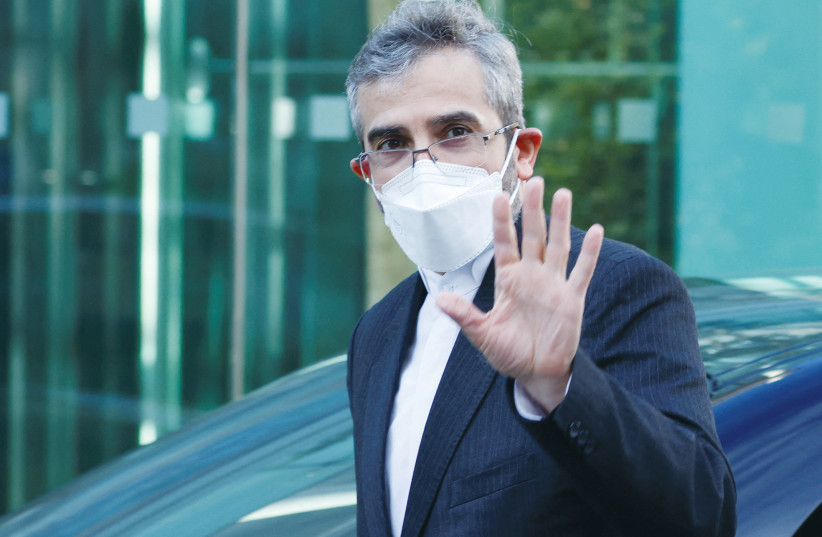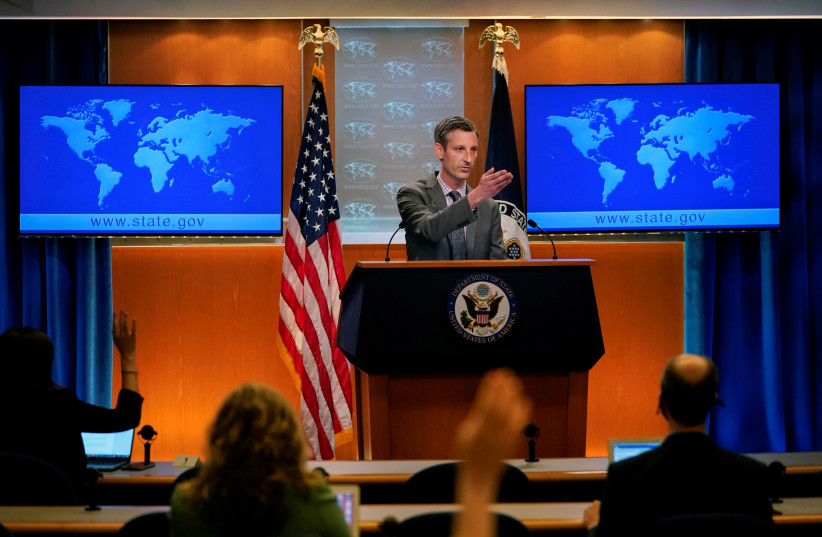“The fact that Russia has now invaded Ukraine should not give Iran the green light to develop a nuclear weapon,” US State Department spokesman Ned Price said.

The US and European states continued partnering with Russia in negotiations to revive the Iran nuclear deal in Vienna, even as they sanctioned Russia over its invasion of Ukraine.
The head of the Russian delegation to the talks, Mikhail Ulyanov, tweeted a photo of the JCPOA participants – US, France, Germany, UK, Russia and China – without Iran, which refuses to negotiate directly with the Americans.
Iran talks continued on Sunday, despite the Western parties to the talks removing Russia from the SWIFT banking system a day earlier, and imposing sanctions on the Russian Central Bank as well as people and entities facilitating the war in Ukraine.
The US and European states plan to launch a transatlantic task force to ensure the implementation of financial sanctions and identify assets of sanctioned individuals and companies.
US State Department Spokesman Ned Price said on Friday that though the invasion of Ukraine has made Russia a “pariah on the world stage,” the US would continue to engage with Moscow on issues “fundamental to our national security interest,” such as the Iran nuclear deal.

“The fact that Russia has now invaded Ukraine should not give Iran the green light to develop a nuclear weapon,” said Price.
Iran’s chief negotiator, Ali Bagheri Kani, was expected to return to Vienna on Monday from Tehran, where he had flown for final consultations on the nuclear talks.
Iranian officials had a number of discussions over the weekend. Iran Supreme National Security Council Secretary Ali Shankhani spoke with UK National Security Adviser Sir Stephen Lovegrove, and Iranian Foreign Minister Hossein Amirabdollahian spoke with EU Foreign Policy chief Josep Borrell about the negotiations.
Amirabdollahian said after the call that he was “seriously reviewing [a] draft of the agreement.”
“All [are] trying to reach a good deal,” the Iranian foreign minister tweeted. “Our red lines are made clear to Western parties. Ready to immediately conclude a good deal, should they show real will.”
Some of the Western parties in the Iran talks said that the negotiations would end this week.
“We will continue until we reach an agreement or announce the collapse of negotiations next week,” French chief negotiator Philippe Errera told Iran International News on Wednesday.
The head of the British delegation to the negotiations, Stephani Al-Qaq, tweeted: “A few difficult issues remain. Work continues to resolve them. #EndgameViennaTalks”
Reuters reported last week that a US-Iranian deal was taking shape in Vienna after months of talks. A draft text of the agreement alluded only vaguely to other issues, namely unfreezing billions of dollars of Iranian assets in South Korean banks, and the release of Western prisoners held in Iran.
The talks are meant to revive the 2015 Joint Comprehensive Plan of Action nuclear deal, which restricted Iran’s uranium enrichment, while gradually lifting sanctions on the regime.
The US departed the JCPOA in 2018 and placed heavy sanctions on Iran, saying Iran hid elements of its nuclear program and continued malign actions and proxy warfare throughout the Middle East. In the ensuing years, Iran upped its uranium enrichment to 60% – weapons-grade is 90% – among other violations of the JCPOA.
Iran has demanded the lifting of all sanctions invoked since the US left the JCPOA, including those for terrorism and human rights violations.
In addition, Iran has sought a guarantee from the US that future presidents will not leave the deal, which the Biden administration cannot legally grant.
Israel has said Iran seeks to stop open International Atomic Energy Agency probes, and the removal of the Islamic Revolutionary Guard Corps’ designation as a terrorist organization, as well as to keep its advanced centrifuges rather than destroy them.
Reuters contributed to this report.
Content retrieved from: https://www.jpost.com/middle-east/article-698819.